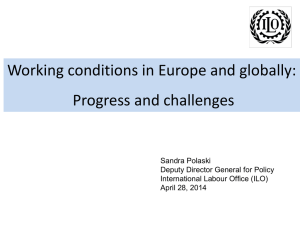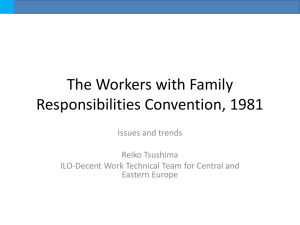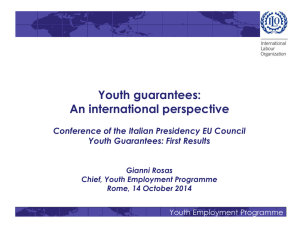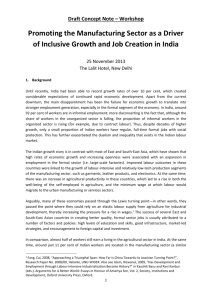Word - United Nations History Project
advertisement
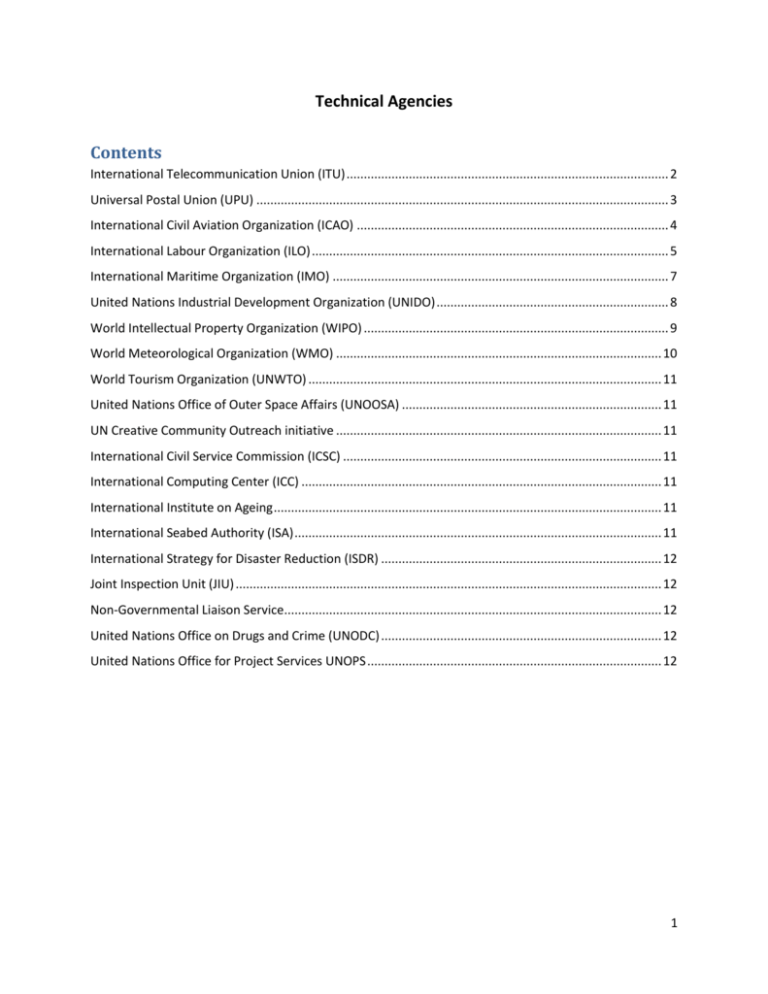
Technical Agencies Contents International Telecommunication Union (ITU) ............................................................................................. 2 Universal Postal Union (UPU) ....................................................................................................................... 3 International Civil Aviation Organization (ICAO) .......................................................................................... 4 International Labour Organization (ILO) ....................................................................................................... 5 International Maritime Organization (IMO) ................................................................................................. 7 United Nations Industrial Development Organization (UNIDO) ................................................................... 8 World Intellectual Property Organization (WIPO) ........................................................................................ 9 World Meteorological Organization (WMO) .............................................................................................. 10 World Tourism Organization (UNWTO) ...................................................................................................... 11 United Nations Office of Outer Space Affairs (UNOOSA) ........................................................................... 11 UN Creative Community Outreach initiative .............................................................................................. 11 International Civil Service Commission (ICSC) ............................................................................................ 11 International Computing Center (ICC) ........................................................................................................ 11 International Institute on Ageing ................................................................................................................ 11 International Seabed Authority (ISA) .......................................................................................................... 11 International Strategy for Disaster Reduction (ISDR) ................................................................................. 12 Joint Inspection Unit (JIU) ........................................................................................................................... 12 Non-Governmental Liaison Service............................................................................................................. 12 United Nations Office on Drugs and Crime (UNODC) ................................................................................. 12 United Nations Office for Project Services UNOPS ..................................................................................... 12 1 Organizations International Telecommunication Union (ITU) ITU is the United Nations specialized agency for information and communication technologies (ICTs). They allocate global radio spectrum and satellite orbits, develop the technical standards that ensure networks and technologies seamlessly interconnect, and strive to improve access to ICTs to underserved communities worldwide. Founded in 1865, some see it as the first major international organization. The International Telecommunication Union: an experiment in international cooperation George Arthur Codding. E.J. Brill. 1952. The International Telecommunication Union in a changing world George Codding & Anthony Rutkowski. Artech House. 1982. The Invisible Weapon: Telecommunications and International Politics, 1851-1945 Daniel Headrick. Oxford University Press. 1991. International Communications: the International Telecommunication Union and the Universal Postal Union Lyall, Francis. Burlington, VT: Ashgate, c2011. The Politics of International Telecommunications Regulation James G. Savage. Westview Press. 1989. Communication and Empire: Media, Markets, and Globalization, 1860-1930 Dwayne R. Winseck and Robert M. Pike. Duke University Press. 2007. The World in 2011: ICT Facts and Figures This publication features end of 2011 estimates for ITU’s key telecommunication/ICT indicators. The brochure, which was published on the occasion of ITU Telecom, on October 25th, 2011, highlights the latest global ICT facts and trends and includes figures on Internet use, fixed and mobile broadband subscriptions, international Internet bandwidth, home ICT access, and more. 2 Universal Postal Union (UPU) The organization fulfills an advisory, mediating and liaison role, and provides technical assistance where needed. It sets the rules for international mail exchanges and makes recommendations to stimulate growth in mail, parcel and financial services volumes and improve quality of service for customers. The Universal Postal Union: coordinator of the international mails George Codding. New York University Press. 1964. Historical development of the Universal Postal Union and the question of membership / Cotreau, James Donald. Boston : [s.n.], 1975. The first book of international mail: The story of the Universal Postal Union Henry Reed Hoke. F. Watts. 1963. “The Political Economy of Postal Reform in the Victorian Age” Richard R. John, Smithsonian Contributions to History and Technology 55 (2010): 3-12. International Communications: the International Telecommunication Union and the Universal Postal Union Lyall, Francis. Burlington, VT: Ashgate, c2011. Universal Postal Union Menon, Manikath Antha Krishna, 1919[New York] Carnegie Endowment for International Peace, 1965. The genesis of the Universal Postal Union; a study in the beginnings of international organization, Sly, John F. (John Fairfield), 1893-1965. Worcester, Mass.,New York, Carnegie Endowment for International Peace, Division of Intercourse and Education [1927] 3 International Civil Aviation Organization (ICAO) The ICAO was created in 1944 to promote the safe and orderly development of international civil aviation throughout the world. It sets standards and regulations necessary for aviation safety security, efficiency and regularity, as well as for aviation environmental protection. Law-making in the International Civil Aviation Organization, Volume 1 Thomas Buergenthal. Syracuse University Press. 1969. ICAO: a history of the International Civil Aviation Organization David MacKenzie. University of Toronto Press. 2010. International Civil Aviation Organization: an introduction Ludwig Weber. Kluwer Law International. 2007 “Report on joint activities with the International Civil Aviation Organization towards the development of air transport in Africa” United Nations. Economic Commission for Africa. 1964. 4 International Labour Organization (ILO) The ILO is the international organization responsible for drawing up and overseeing international labour standards. It is the only 'tripartite' United Nations agency that brings together representatives of governments, employers and workers to jointly shape policies and programmes promoting Decent Work for all. This unique arrangement gives the ILO an edge in incorporating 'real world' knowledge about employment and work. Histories of labour: national and international perspectives Edited by Joan Allen, Alan Campbell and John McIlroy. Published: Pontypool, Wales : Merlin, 2010. “What’s in a living standard? The ILO and the League of Nation’s Depression Delegation, 1938-1945” Patricia Clavin. ILO. April 16, 2009. ILO histories : essays on the International Labour Organization and its impact on the world during the twentieth century Edited by Jasmien van Daele ... [et al.]. Published: Bern; New York : Peter Lang, 2010. Engineering Social Peace: Networks, Ideas, and the Founding of the International Labour Organization Jasmien Van Daele, International Review of Social History 50 (2005), p. 435-466 Sir Harold Beresford Butler. Jaci Eisenberg. September 14, 2011. Antecedents of the International Labour Organization. Follows, John William, 1908- Published: Oxford, Clarendon Press, 1951. The International Labour Organization (ILO): coming in from the cold Steve Hughes and Nigel Haworth. Published: Milton Park, Abingdon, Oxon; New York: Routledge, 2011. Various ILO Agreements with International Organizations International Labour Organization Stephen Hughes & Nigel Haworth. Routledge. 2009. From Transnational Reformist Network to International Organization: The International Association for Labour Legislation and the International Labour Organization (1900 – 1930s) Sandrine Kott/Davide Rodogno/Bernhard Struck/Jakob Vogel (eds), New York 2011 The International Labour Organization and the quest for social justice 1919-2009 Gerry Rodgers ... [et al.]. Published: Ithaca : ILR Press/Cornell University Press ; Geneva : International Labour Office, 2009. Edward Phelan and the ILO: the life and views of an international social actor Published: Geneva: International Labour Office, 2009. Key Indicators of the Labour Market. International Labour Organization. October, 2011. 5 Protecting the working poor. Annual Report 2010. ILO Microinsurance innovation facility. May, 2011. The Constitution of the International Labour Organisation The original ILO Constitution was included in the Treaty of Versailles in 1919 as Part XIII of the Treaty. 6 International Maritime Organization (IMO) IMO – the International Maritime Organization – is the United Nations specialized agency with responsibility for the safety and security of shipping and the prevention of marine pollution by ships. In 1948 an international conference in Geneva adopted a convention formally establishing IMO (the original name was the Inter-Governmental Maritime Consultative Organization, or IMCO, but the name was changed in 1982 to IMO). The IMO Convention entered into force in 1958 and the new Organization met for the first time the following year. The carriage of dangerous goods by sea: the role of the International Maritime Organization in international legislation Cleopatra Henry. St. Martin’s Press. 1985. The International Maritime Organization Edited by Samir Mankabady. Published: London ; Wolfeboro, N.H. : Croom Helm, c1986-1987. Description: 2 v. ; 23 cm. Incomplete contents: v. 1. International shipping rules. -- v. 2. Accidents at sea. Notes: Rev. ed. of: The International Maritime Organisation. c1984. Current maritime issues and the international maritime organization Myron Nordquist, John Moore, University of Virginia, Center for Oceans Law and Policy. Martinus Nijhoff Publishers. 1999. 7 United Nations Industrial Development Organization (UNIDO) UNIDO is the specialized agency of the United Nations that promotes industrial development for poverty reduction, inclusive globalization and environmental sustainability. See the theme ‘development’ for further details. Long-term conflict prevention and industrial development: the United Nations and its specialized agency, UNIDO Ralf Bredel, UNIDO. Martinus Nijhoff Publishers. 2003. The United Nations Industrial Development Organization: UNIDO and problems of international economic cooperation Youry Lambert. Praeger. 1993. United Nations Industrial Development Organization: 30 years of industrial development, 1966-1996. UNIDO. ISC in association with UNIDO. 1995. 8 World Intellectual Property Organization (WIPO) It is dedicated to developing a balanced and accessible international intellectual property (IP) system, which rewards creativity, stimulates innovation and contributes to economic development while safeguarding the public interest. Search IP databases Resisting Intellectual Property Debora Jean Halbert, Psychology Press. 2005. The World Intellectual Property Organization: Resurgence and the Development Agenda Christopher May, London; New York: Routledge, 2007. Intellectual Property and Information Wealth: Issues and Practices in the Digital Age Peter Yu. Greenwood Publishing Group, 2007. 9 World Meteorological Organization (WMO) It is the UN system's authoritative voice on the state and behavior of the Earth's atmosphere, its interaction with the oceans, the climate it produces and the resulting distribution of water resources. Meteorology as Infrastructural Globalism. Paul N Edwards. 2006. Historical essays on meteorology, 1919-1995: the Diamond Anniversary history volume of the American Meteorological Society Edited by James Rodger Fleming ; [foreword by Warren M. Washington]. Published: Boston, MA : American Meteorological Society, 1996. The history of meteorology to 1800 H. Howard Frisinger. Published: New York : Science History Publications, 1977. Memories of the Bureau of Meteorology. Chapter 2: International Meteorology. W.J. Gibbs. Buerau of Meteorology. Melbourne, Australia. "The International Meteorological Organization (IMO) 1879-1950". WMO. E. I. Sarukhanian and J.M. Walker The history of weather James Thaxter Williams. Published: Commack, N.Y. : Nova Science Publishers, 1999. 10 World Tourism Organization (UNWTO) The UNWTO is the leading international organization in the field of tourism. It serves as a global forum for tourism policy issues and a practical source of tourism know-how. It plays a central and decisive role in promoting the development of responsible, sustainable and universally accessible tourism, paying particular attention to the interests of developing countries. United Nations Office of Outer Space Affairs (UNOOSA) The United Nations Office for Outer Space Affairs implements the decisions of the General Assembly and of the Committee on the Peaceful Uses of Outer Space. The office has the dual objective of supporting the intergovernmental discussions in the Committee and its Scientific and Technical Subcommittee (S&T) and Legal Subcommittee, and of assisting developing countries in using space technology for development. UN Creative Community Outreach initiative International Civil Service Commission (ICSC) Its mandate is to regulate and coordinate the conditions of service of staff in the United Nations common system, while promoting and maintaining high standards in the international civil service. International Computing Center (ICC) The ICC was established as a common service, providing a wide range of Information and Communication Technology Services, on a cost recovery basis, to its users worldwide. It was originally set up to meet the needs of three organizations; the UN, the UNDP and WHO were the founding organizations of the ICC. The Centre has grown over the years to count now more than 25 Partner Organizations and a large number of other Users. International Institute on Ageing Malta was first to raise the question of Ageing as a matter of international concern at the United Nations in 1968. Eventually in 1979 the General Assembly agreed to call a World Assembly on Aging in 1982. In its Resolution 37/51 it recommended inter-alia the promotion of training and research, as well as the exchange of information and knowledge in order to provide an international basis for social policies and action. International Seabed Authority (ISA) The Authority is the organization through which States Parties to the Convention shall, in accordance with the regime for the seabed and ocean floor and subsoil thereof beyond the limits of national 11 jurisdiction (the Area) established in Part XI and the Agreement, organize and control activities in the Area, particularly with a view to administering the resources of the Area. International Strategy for Disaster Reduction (ISDR) The ISDR’s mandate is to serve as the focal point in the United Nations system for the coordination of disaster reduction and to ensure synergies among disaster reduction activities. Joint Inspection Unit (JIU) The Inspectors have the broadest powers of investigation in all matters having a bearing on the efficiency of the services and the proper use of funds and, to these ends, may make on-the-spot inquiries and investigations. They are mandated to provide an independent view through inspection and evaluation aimed at improving management and methods and at achieving greater coordination between organizations. Non-Governmental Liaison Service The United Nations Non-Governmental Liaison Service (NGLS) promotes constructive relations between the United Nations and civil society through dynamic partnerships to foster greater coherence around cross-cutting and emerging issues on the UN’s agenda and by facilitating meaningful civil society engagement in UN processes. United Nations Board of Auditors http://www.un.org/auditors/board/ United Nations Office for Partnerships http://www.un.org/partnerships/ United Nations Geographic Information Working Group http://www.ungiwg.org/ United Nations Institute for Training and research http://www.unitar.org/ United Nations Office on Drugs and Crime (UNODC) UNODC is mandated to assist Member States in their struggle against illicit drugs, crime and terrorism. In the Millennium Declaration, Member States also resolved to intensify efforts to fight transnational crime in all its dimensions, to redouble the efforts to implement the commitment to counter the world drug problem and to take concerted action against international terrorism. United Nations Office for Project Services UNOPS UNOPS mission is to expand the capacity of the UN system and its partners to implement peacebuilding, humanitarian and development operations that matter for people in need. 12

